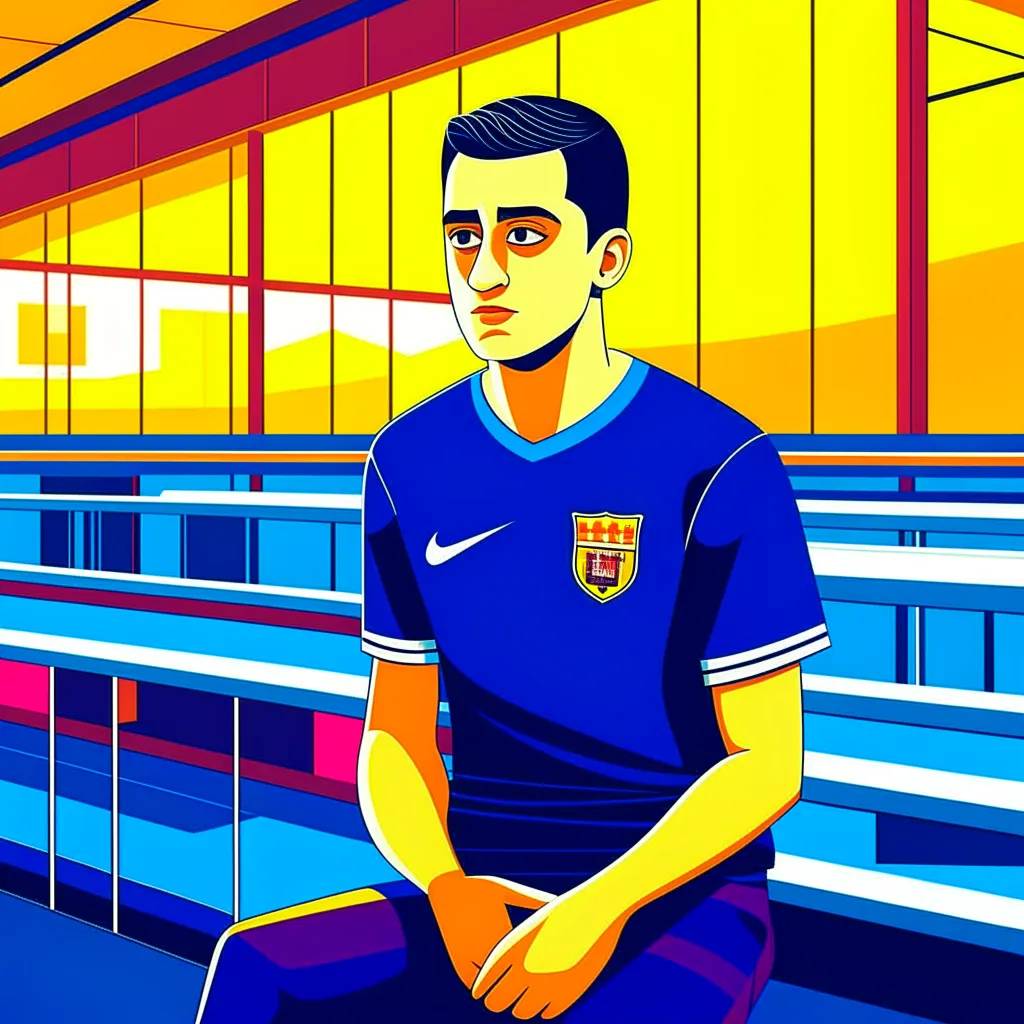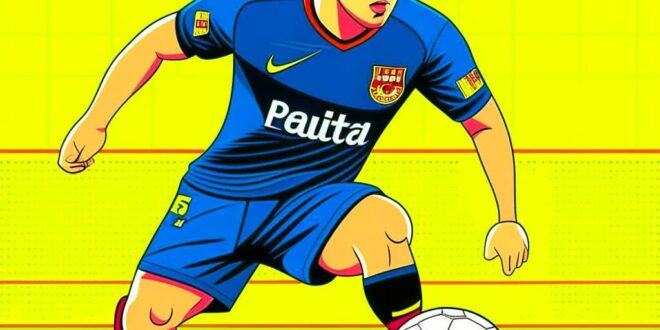Table of Contents
Want to learn about the amazing journey of Xavi Hernandez, from his time in La Masia, to his incredible tenure at Barcelona, and his international success with Spain? Want to know about the playing style and tactical genius that defined Xavi’s career, and his transition to coaching, from leading Al Sadd to returning to revitalise Barcelona? And finally, do you want to know about the incredible feats and impact of this footballing legend?
Key Takeaways
- Learn more about Xavi Hernandez’s early life and growth at La Masia that shaped the player we came to admire
- Watch Xavi’s rise to superstardom at FC Barcelona, where he won a boatload of trophies and was key to the team’s success.
- Experience Xavi’s international wins with Spain, showcasing how he led and orchestrated the game at the highest level
- Get to know the tactical genius and playing style that made Xavi one of the best, a legend of football, the figurehead of possession and a passing game
- See Xavi’s journey from superstar player to promising coach, from his time coaching Al-Sadd to his return home and project to rebuild the team
Early Life and La Masia Years
He was born in Terrassa, a city in Catalonia on January 25, 1980 and since childhood Xavi Hernandez has been all about soccer. He was one of those children who showed signs of a natural talent and love for the game at a very young age, and he eventually turned that passion into a career that would see him become one of the most accomplished players in the history of Spanish soccer.
At just 11 years old, in 1991, Xavi became a member of one of the most prestigious youth academies in the world when he joined the prestigious FC Barcelona youth academy, La Masia. La Masia has a long tradition of producing the best footballers in the world, and the decision to spend his formative years there would shape the rest of his life.
During his time at La Masia, Xavi was fully committed to the team above all else philosophy that was part of the culture at La Masia. He learned to play the Barcelona way: a tactical style of play based on keeping the ball and winning games with superior technique and tactics. Xavi was a natural fit for the system, as he was an incredibly intelligent player who was blessed with great vision and passing ability. These attributes perfectly suited his style of play, and he excelled in the environment, where he could control the game and the rhythm of the match with the cool poise of a seasoned professional.
As he worked his way up through the ranks, it became increasingly clear to everyone involved just how special Xavi was. His dedication to the system and his commitment to self-improvement made him a coach and teammate favorite. He could dominate the midfield, read the game and deliver precise passes, abilities that would become the hallmark of his illustrious career.
The training he received at La Masia during his formative years were instrumental in learning the skills that would later define his career at club and international level. The emphasis on teamwork, on technique, on the tactics of the game, these were all things that he learnt in those early years at the academy, and would pretty much define him in the way that he played. They’re what made him one of the best, and most influential, midfielders of his generation.

Rise to Stardom at Barcelona
Breakthrough in 1998: The Debut
When Xavi Hernandez made his first-team debut for Barcelona in 1998, it was the beginning of something great. Just 18 years old, Xavi had come up through the ranks at La Masia, Barcelona’s youth academy, where he’d been honing his skills since he was 11. Senior football opened the door to greatness. Xavi had always been at ease on the ball, and saw the game differently than others, which quickly set him apart. The rest is history.
Solidifying a Midfield Maestro
Quickly cementing his place in the midfield, Xavi was a pivotal player who made an impact from day one. His skill in setting the tempo of the game, as well as his nearly unmatched passing precision, made Xavi an invaluable part of FC Barcelona. Xavi’s style of play, and his skill at tiki-taka in particular, allowed Barcelona to dominate possession and control the game—Xavi’s function wasn’t just to connect passes, but to see the game several moves ahead, and make decisions that would raise the level of the entire team.
Pillar of Success Across Eras
Xavi ha sido un jugador clave de la edad dorada del FC Barcelona, y ha jugado bajo las órdenes de diferentes entrenadores – Frank Rijkaard, Pep Guardiola, Luis Enrique – su capacidad de adaptación le convirtió en intocable en un equipo cuyo sistema cambiaba constantemente. Asistencia en pases, circulación de balón, creación de juego desde la medular del campo Xavi podía hacer de todo. Acompañados de sus compañeros Andrés Iniesta y Lionel Messi, el tridente era casi imparable y encadenaban victorias una tras otra.
A Trophy-Laden Career
Xavi’s time at Barcelona saw him winning multiple La Liga titles and Champions League trophies. He first won La Liga in the 1998-1999 season, but it was under Pep Guardiola that Barcelona’s golden era began. The team went on to win numerous La Liga titles and Champion League trophies, and Xavi’s role as midfield orchestrator was key to it all. In total, he won 8 La Liga titles and 4 Champion Leagues, underscoring his influence on the squad.
Ascending as a Global Icon
A textbook example of one of the best midfielders of all time, Xavi was a household name, recognized globally. The epitome of the modern playmaker, Xavi was celebrated for his smart, perceptive, and precise play. Fans loved him not only for his club play, but because he helped Spain win the 2010 FIFA World Cup, UEFA European Championship in 2008, and UEFA European Championship in 2012, he was a household name and appreciated everywhere.
An Unparalleled Barcelona Career
And with 767 appearances and 85 goals for Barcelona, Xavi’s legacy is carved into the history books of the club. But that’s just it – these numbers don’t really mean anything alone. They just convey part of the story, not the whole story. Because over nearly two decades, he hasn’t just amassed a large number of appearances and goals but also a large number of assists and dictator-level performances that have defined Barcelona’s football. His legacy is more than just numbers. It’s the style of play he’s stamped onto the club and future generations of footballers.
International Success with Spain
Debut for Spain’s National Team in 2000
Xavi Hernandez’ journey with the Spanish national team started in 2000. It was the beginning of a dynasty and international glory for Spain. From the fabled Barcelona youth academy of La Masia to Spain’s influential leader, Xavi brought his masterful playmaking and distribution to the national side. His early years were a learning experience, but his skill and footballing brain was evident—he was soon a key figure on the team.
Pivotal Role in Spain’s Golden Era
Xavi was a big part of Spain’s golden era, a time when the national team achieved historic success. He helped in ways beyond scoring goals, or making assists; Xavi controlled the game. His vision, and ability to read the game let Spain have the ball, make opponents run, and tire them out, effectively controlling the match, and making the team very difficult to play against. He was the perfect poster boy for tiki taka. During his time with the national team, Spain was the team that wanted to play, and had the ball; they played with and around opponents.
Spain’s 2008 and 2012 European Championships
Xavi was part of what made Spain champions of Europe in 2008 and 2012. His skill as a midfield conductor was vital in making the whole team work. In the 2008 tournament, Spain’s 44-year major tournament trophy-less streak came to an end as they lifted the trophy, Xavi himself was named Player of the Tournament. In 2012, Spain would become the first team to win back-to-back European Championships, which couldn’t have happened without his exceptional play-making and game management.
Spain’s 2010 FIFA World Cup Triumph
Xavi’s career highlight as an international was winning the 2010 FIFA World Cup. The midfield maestro was Spain’s metronome, pulling the strings and, as usual, keeping possession. He dominated matches and helped secure the first world championship for Spain. Xavi showcased his exceptional technical ability, his soccer smarts, and his talent for always finding his teammates at key moments.
133 Appearances and 13 Goals for Spain
In 133 games with the national team, Xavi scored thirteen goals. They’re nice statistics, but they don’t mean much. More important than the numbers is what Xavi gave to his team every time he took the field. He made his teammates better. He helped them be more secure. Xavi’s continuity and his commitment to the greater good of the team were key to our achievements over so many years. Even when he was assisting, making a key pass, or simply keeping the ball in circulation, Xavi was always working in the interests of the national team.
Retirement After the 2014 World Cup
Xavi retired from international soccer after 2014, closing a huge chapter in Spain’s soccer history. Though 2014 was a tough year for Spain, Xavi was still able to go on a high note. Leaving the national team behind let Xavi focus on his club career and later his coaching career, and carry on shaping the game. His retirement was the end of one chapter for Spain, but his impact continues to be felt in international soccer.
Tactical Brilliance and Playing Style
Xavi Hernandez is a big name in the football world, celebrated for his footballing brain and his skill on the ball. A central midfielder, he’s served as a model for the game and a living example of the possession-based, pass-focused approach that has made Barcelona and the Spanish national team so successful.
Master of Tiki-Taka
Xavi was the emblem of the tiki-taka philosophy, a style of play characterized by short, sharp passing and keeping the ball at all costs. He was the consummate game manager, able to set the tempo of the game, pass the ball efficiently and direct proceedings from the middle of the field to shape the way the game was played—a fundamental ingredient to the success of his team, Barcelona and Spain.
Exceptional Vision and Passing
Xavi had such good passing and vision he could see the game in a way few could, and make the most pinpoint, accurate passes to his teammates. He could “thread the needle” to unlock defenses and give his teammates a good chance to score, all because of his ability and understanding.
Midfield Control
Xavi’s control and influence in the midfield was almost unparalleled. He excelled in possession, in dictating the game, in ensuring his team kept the ball for long stretches. His positional play, his understanding of space allowed him to support the play in defensive midfield, allowing him to dictate play in attack.
Tactical Intelligence
Xavi’s intelligence for football was another massive part of his game. He had a great understanding of positional play and creating space that allowed him to make good decisions and put himself in the right positions on the field. His ability to read the game and predict where his teammates and opponents would go was another reason that Barcelona and Spain were so tactically brilliant.
Leadership on the Field
As well as being highly skilled technically and tactically, Xavi was a leader on the field, directing his teammates, setting the tone for the team’s performance, and ensuring that everyone was on the same page. His cool and collected nature, combined with his ability to make the right decision under pressure, were key to closing out games and earning victories.
Transition to Coaching
Retired from Playing
After an illustrious career as a player which saw him lift many titles and personal accolades, Xavi Hernandez retired in 2019 after a stint with Qatari side Al Sadd. The Barcelona legend, who spent most of his career wearing the red and blue, symbolized the club’s possession-heavy, tiki-taka style, under the guidance of coaching greats such as Pep Guardiola. Retiring from Al Sadd closed the curtain on the time of one of the most influential and successful players of his generation, and opened the doors to Xavi the coach.
Coaching at Al Sadd
Having just retired, Xavi was quick to get into coaching—he took over the helm of Al Sadd in 2019. A chance to implement the type of possession-heavy tactical play he is famous for, and begin to mold the team in his own style. Drawing on what he learned from his time under Guardiola, Luis Enrique, and others, Xavi was free to try new things and bring new tactics, and an organized, team-focused style of play to Al Sadd, preparing him to take on coaching roles in the future.
Tactical Innovations at Al Sadd
When Xavi became the head coach of Al-Sadd, he set out to transform the gulf team into a replica of the Barça tiqui-taca style that made him so happy during his playing stage. The objective was to have the same game of pass and move, which was based on winning the ball back when lost through pressure, and then controlling the game in possession through technique, decision-making and movement. Also, to press in an orderly fashion, to be aggressive and take advantage of space in transition, which would serve to win games and be considered a coach of the future, very innovative and intelligent tactically.
Return to Barcelona
After a brief introduction to the coaching world with Al-Sadd, Xavi took on the role of a lifetime, returning to his childhood club as the new head coach of FC Barcelona in November 2021. Sense of anticipation and concern mingled as Xavi prepared to rebuild a Barcelona team that had been left devastated by injuries on the field and was suffering from financial troubles off the field, but he was not afraid. Eager to take on the Barcelona challenge, to rebuild it, restore the club’s identity, and ultimately lead it back to the top.
Rebuilding Barcelona
Xavi’s return to Barcelona as coach was anything but straightforward. The club was in the middle of a severe financial crisis that had huge implications for the team and its future. Forced to sell in order to buy, with just a few resources available for new signings, and a lot of high earners that he would need to move on, Xavi had to navigate incredibly tough waters, and ones that would demand smart decisions, adaptability, and the ability to continue getting the best out of a team that was now much less well-equipped. But Xavi was unwavering in his determination to rebuild Barcelona in the mold of his old side, and he knew that doing so would take time, hard work, and a lot of grinding, a stamina of holding on, and a lot of opportunities for young players.
Emphasis on Youth and Discipline
In his efforts to rebuild Barça, Xavi achieved a real revolution, raising the reserves to a higher level used to find and exploit talented youth in the first team. Footballers such as Lamine Yamal, Pau Cubarsí, Hèctor Fort, Marc Guiu, Fermín López, and a few more seized the chances that Xavi gave them to show that they were up to the task, as he looked to add some freshness to the mix of players at his disposal. In addition, Xavi managed to inculcate a very disciplined playing style, very team orientated within the team. In an ingredient he took from his other coaches Guardiola and Luis Enrique, looking to make the players more responsible and play all for one and one for all in order to recover the plenary and absolutist dominance and identity of Barça in Spain and Europe.
Achievements in First Season
In his first full season at the helm, Xavi has delivered an incredible La Liga title for FC Barcelona, finishing 10 points ahead of arch-rivals Real Madrid. This remarkable achievement in Xavi’s debut season, a campaign in which the club was hamstrung by financial concerns and had to be rebuilt, highlights Xavi’s football brain, his ability to inspire and organize, and his unwavering commitment to sticking with the Barcelona style: possession-based, high pressing football that once defined Barcelona’s golden era. On top of the league title, Xavi’s Barcelona also lifted the Spanish Super Cup, reinforcing their domestic dominance and giving Barcelona fans reason to believe for the future.
Evolving Legacy of Xavi Hernandez
Xavi Hernandez’s journey from La Masia to international soccer superstar, his standout performances at Barcelona and with the Spain national team and now his coaching career – it all adds up to a legacy of strategy, camaraderie and elbow grease. He is tiki-taka personified; the guy who can see the whole pitch like nobody else, pass like nobody else, and take command of the middle of the field like nobody else. From his Barça days to his Spain days, Xavi went from regional hero to global soccer phenomenon. His coaching years at Al Sadd and homecoming to Barcelona demonstrate that his passion for the game still burns strong and bright and he is unwavering in his mission to nurture young talent, push tactical boundaries and regenerate a richly historic club despite financial hardship.
Frequently Asked Questions
Q1: Where was Xavi Hernandez born?
Xavi Hernandez was born in Terrassa, a Catalonia city in Spain, on January 25, 1980.
Q2: When did Xavi join La Masia and why was it significant?
Xavi arrived at La Masia in 1991, at 11 years old. That’s important because ‘La Masia’ is where FC Barcelona nurture the best talent, and where Xavi nurtured his skills and philosophy of play.
Q3: What aspects of Xavi’s game were developed at La Masia?
Xavi learned tiki taka at La Masia, a style of possession-based tactical football, because he has superhero vision, and superhuman touch when it comes to passing the ball straight to his teammate’s feet.
Q4: When did Xavi make his first-team debut for FC Barcelona?
Xavi made his first-team debut for FC Barcelona in 1998 at 18 years old.
Q5: What is tiki-taka and how did Xavi contribute to it?
Tiki-taka is a play style characterized by short passing and movement, maintaining ball possession, and working the ball through various channels. Xavi was a master of this, able to turn entire games in his team’s favor through possession and game control.
Q6: Which managers played a significant role in Xavi’s career at Barcelona?
Xavi played under a few influential managers including Frank Rijkaard, Pep Guardiola and Luis Enrique, who each had their own successful eras at Barcelona.
Q7: What were some of Xavi’s major achievements with FC Barcelona?
During his time at Barcelona Xavi won 8 La Liga titles and 4 Champions League titles, among many other accolades, and was pivotal in almost every win.
Q8: How did Xavi perform on the international stage with Spain?
Xavi was a big reason that Spain was so successful, winning the 2008 and 2012 UEFA European Championships as well as the 2010 FIFA World Cup.
Q9: What were Xavi’s contributions to Spain’s 2010 World Cup victory?
Xavi’s ability to control the midfield and the ball was key to Spain’s gameplan, and instrumental in helping Spain win its first World Cup.
Q10: How did Xavi transition from playing to coaching?
In 2019, after retiring as a player, Xavi hung up his boots and began his coaching career with Qatari club Al Sadd, introducing a possession-focused, tactical style similar to what he did at Barcelona.
Q11: What tactical innovations did Xavi introduce at Al Sadd?
At Al Sadd, Xavi’s style is all about tiki-taka principles, like possession, technical skills and other stuff like pressing / transitional play.
Q12: When did Xavi become the head coach of FC Barcelona?
Xavi returned as head coach to FC Barcelona in November 2021.
Q13: How did Xavi handle Barcelona’s financial difficulties as head coach?
Xavi managed Barcelona’s financial struggles through smart decisions, changing tactics, and infusing youth into the squad while still amplifying his existing players.
Q14: What were Xavi’s achievements in his first full season as Barcelona’s head coach?
In his first full season, Xavi led FC Barcelona to a La Liga championship with a 10-point lead over Real Madrid, and also won the Spanish Super Cup.



